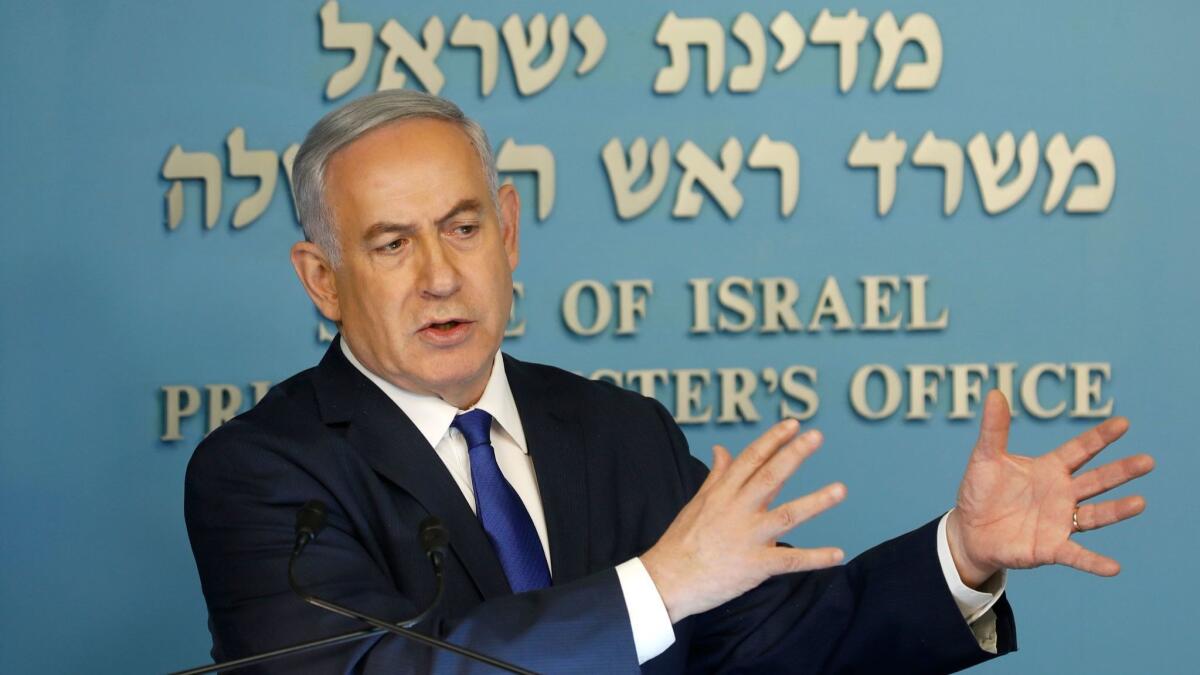Israel reaches agreement with U.N. on African refugees — then suspends it in face of criticism

Israeli Prime Minister Benjamin Netanyahu announced an “unprecedented agreement” with the United Nations on Monday that appeared, for a few hours, to provide a solution for tens of thousands of mostly African asylum seekers whose fate had moved hundreds of thousands of Israelis to protest against the government in escalating weekend rallies.
Then, almost as soon as he announced it, he suspended it.
In a public address to the nation, Netanyahu initially presented the deal with the U.N. High Commissioner for Refugees as a double victory that he had achieved in the face of two major challenges.
One was a decision by Israel’s Supreme Court, which recently rescinded the authorization it had provisionally granted to deport thousands of asylum seekers from Israel. The second was that a plan to return the refugees to unidentified third countries — understood by everyone to be Rwanda and Uganda — “collapsed in the face of pressure,” Netanyahu said.

The high court had reversed its initial consent to the deportations when it was revealed that conditions in Rwanda and Uganda did not meet basic humanitarian standards. The two countries in turn refused to accept the refugees when they learned the deportations would be forced.
According to Netanyahu, the UNHCR plan would have entailed the immediate cancellation of deportation orders that had already been issued to some of the migrants, who are mostly from Sudan and Eritrea, and the orderly resettlement of about half of them in “the most advanced countries, like Canada or Germany or Italy” over a five-year period.
The 16,000 remaining in Israel would have seen their status legalized, with all asylum seekers in Israel expected to receive work permits.
But Netanyahu did not inform his ministers of the plan ahead of time, and caught unawares, they lashed out.
Education Minister Naftali Bennett, a rival for the post of prime minister, slammed the plan as “a promise of paradise for illegal infiltrators.”
Israel’s culture minister, Miri Regev, one of Netanyahu’s staunchest allies, who is famous for calling Sudanese refugees “a cancer upon our body” during the 2012 electoral campaign, declared that she was “worried by the rapid surrender of basic policy principles.”
Hours later, Netanyahu announced his suspension of the deal in apparent surrender to their demands.
The agreement had been hailed by advocates for the refugees, in particular the Movement to Halt the Deportation of Asylum Seekers, which coordinated mass protests and demonstrations in recent months, even gathering Holocaust survivors to rail against Netanyahu for turning away refugees and offering to open their own homes.
“It feels wonderful!” exulted Mickey Gitzin, the executive director in Israel of the New Israel Fund, one of the organizations that led the movement. Speaking before the suspension was announced, he cautioned that “in other respects I’m aware of the great responsibility and a lot of work ahead of us.” He cited a long list of tasks ranging from proper documentation of the refugees to massive infrastructure improvement needed in south Tel Aviv. The long-neglected district where most of the Sudanese and Eritrean refugees gravitated has not reaped the benefits of Israel’s high-tech boom.
The concentration of the refugees there has caused severe social upheaval among the neighborhood’s disadvantaged residents.
In a statement posted before Netanyahu suspended implementation of the deal, the UNHCR lauded what it called a “Framework of Common Understanding” for 39,000 Eritreans and Sudanese living in Israel. (Netanyahu put the number at 32,000.)
“UNHCR appreciates the collaboration with the government of Israel to find a way out for thousands of Eritreans and Sudanese. This agreement will ensure that protection is provided to those who need it,” said Volker Türk, UNHCR assistant high commissioner for protection, who signed the agreement on behalf of UNHCR.
Later, after the suspension, UNHCR spokesperson Sharon Harel said the agency had no further comment.
Details of the aborted plan have not been made public and political opposition to it was widespread.
Israeli opposition Labor Party leader Avi Gabbay said of the initial plan that it had been “Labor’s plan all along.”
Meanwhile, Germany and Italy were quick to issue denials of any connection to Israel’s refugee resettlement scheme.
Mutasim Ali, a leader of Israel’s refugee rights movement, said in a text message that proved to be prophetic: “I don’t call this a win until it is finalized, and if it’s a win then everyone won, including the government, by limiting its expenses in making life miserable for asylum seekers. It’s a win for society because we can be an asset. And it’s a win for Israel.”
In a first reaction following the suspension, at nearly midnight, the New Israel Fund released a statement in Hebrew saying: “The prime minister succumbed to the extremist voices on his Facebook page and retreated to inciting and lying…. Having embarrassed the state of Israel in front of the world, the prime minister has returned to playing political survival games at the expense of the national interest. The prime minister’s fear-mongering, incitement and weakness in the face of pressure will be written into the state of Israel’s history books.”
Tarnopolsky is a special correspondent.
More to Read
Sign up for Essential California
The most important California stories and recommendations in your inbox every morning.
You may occasionally receive promotional content from the Los Angeles Times.










